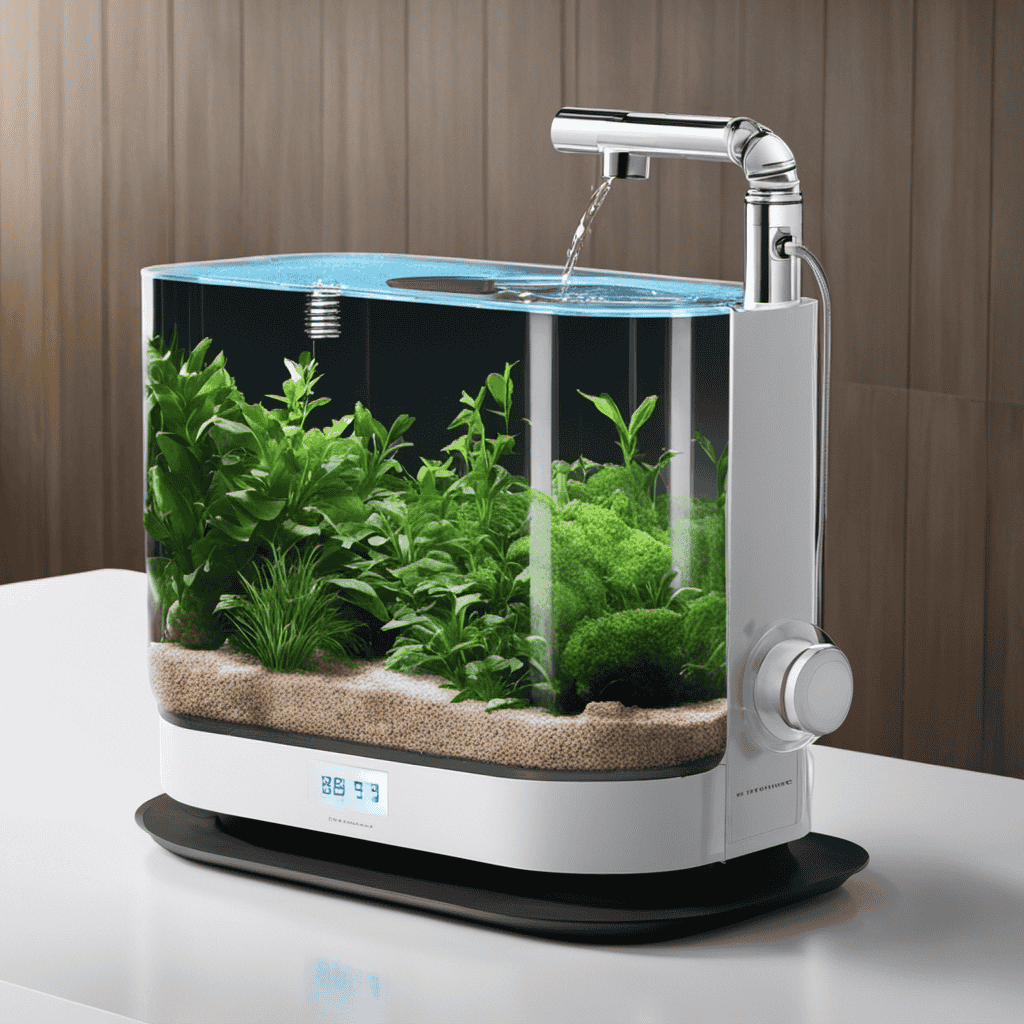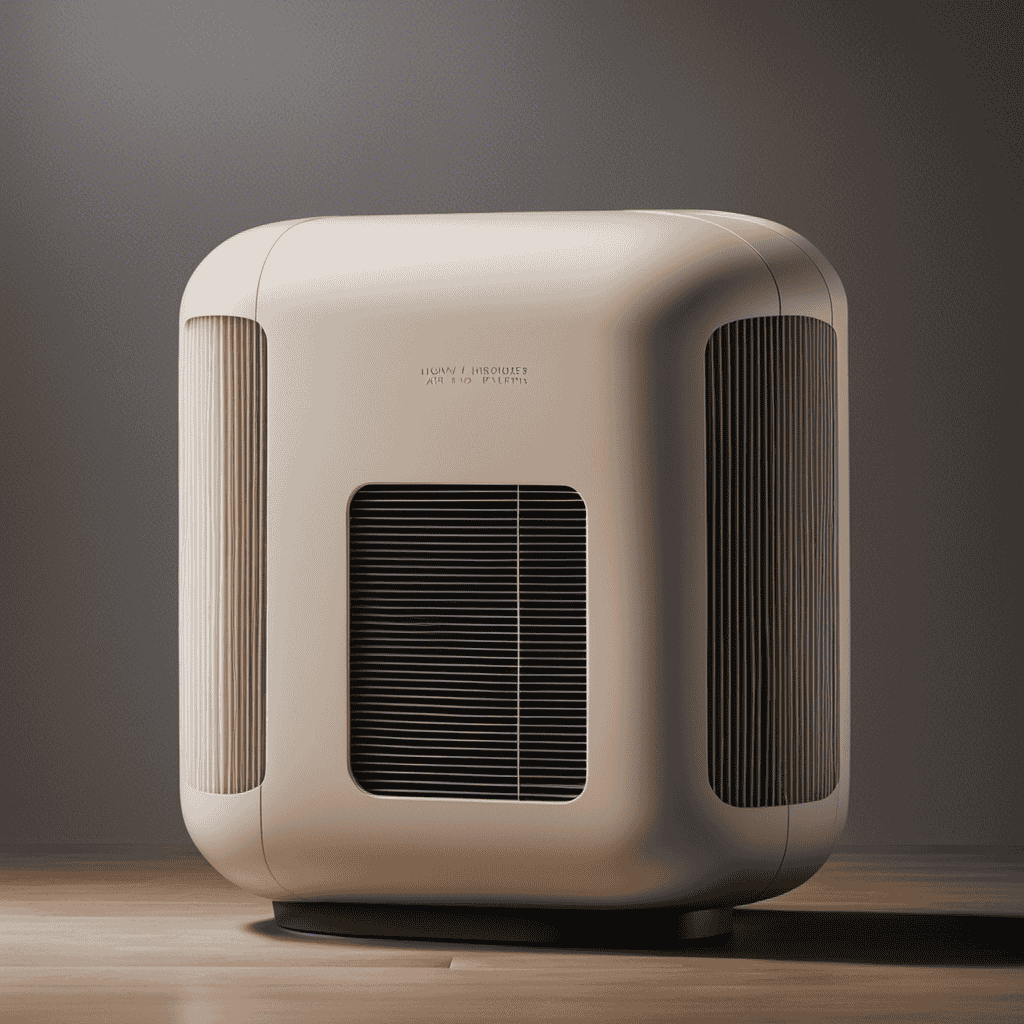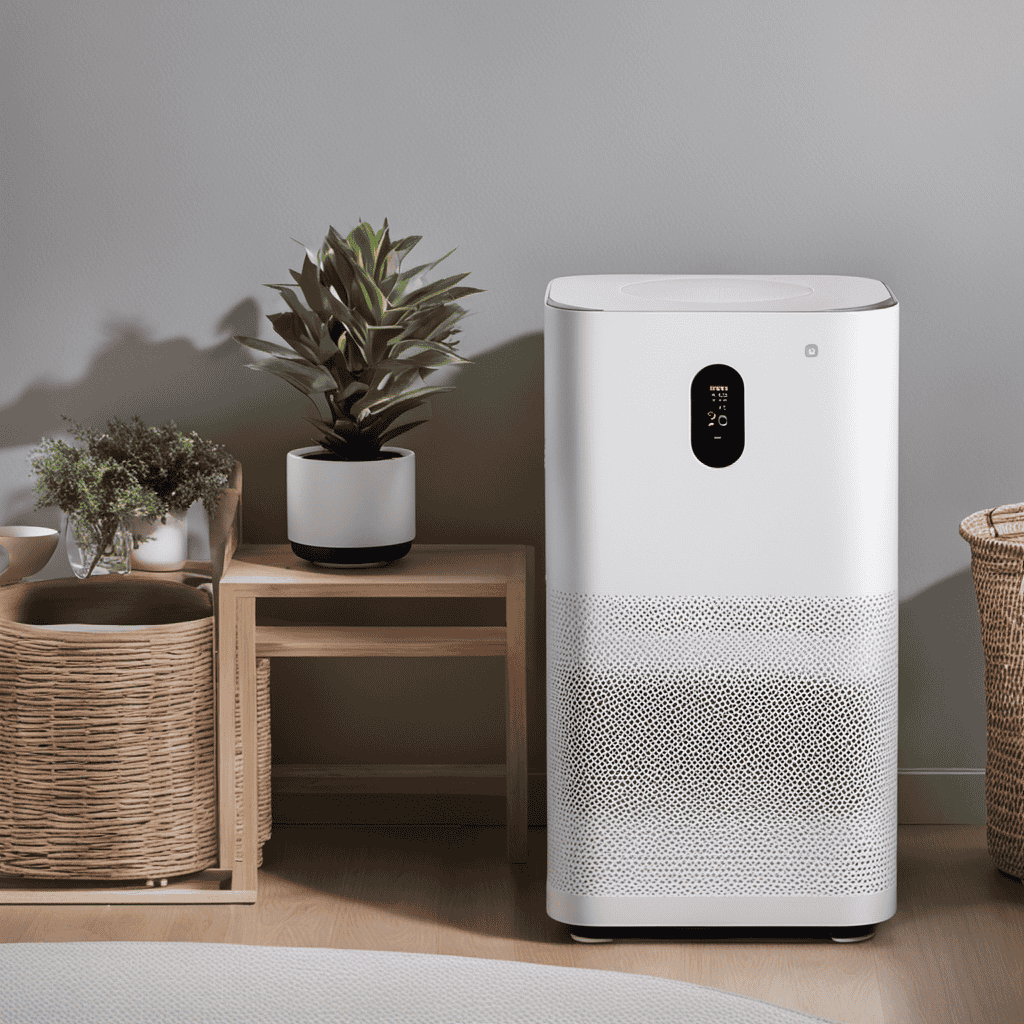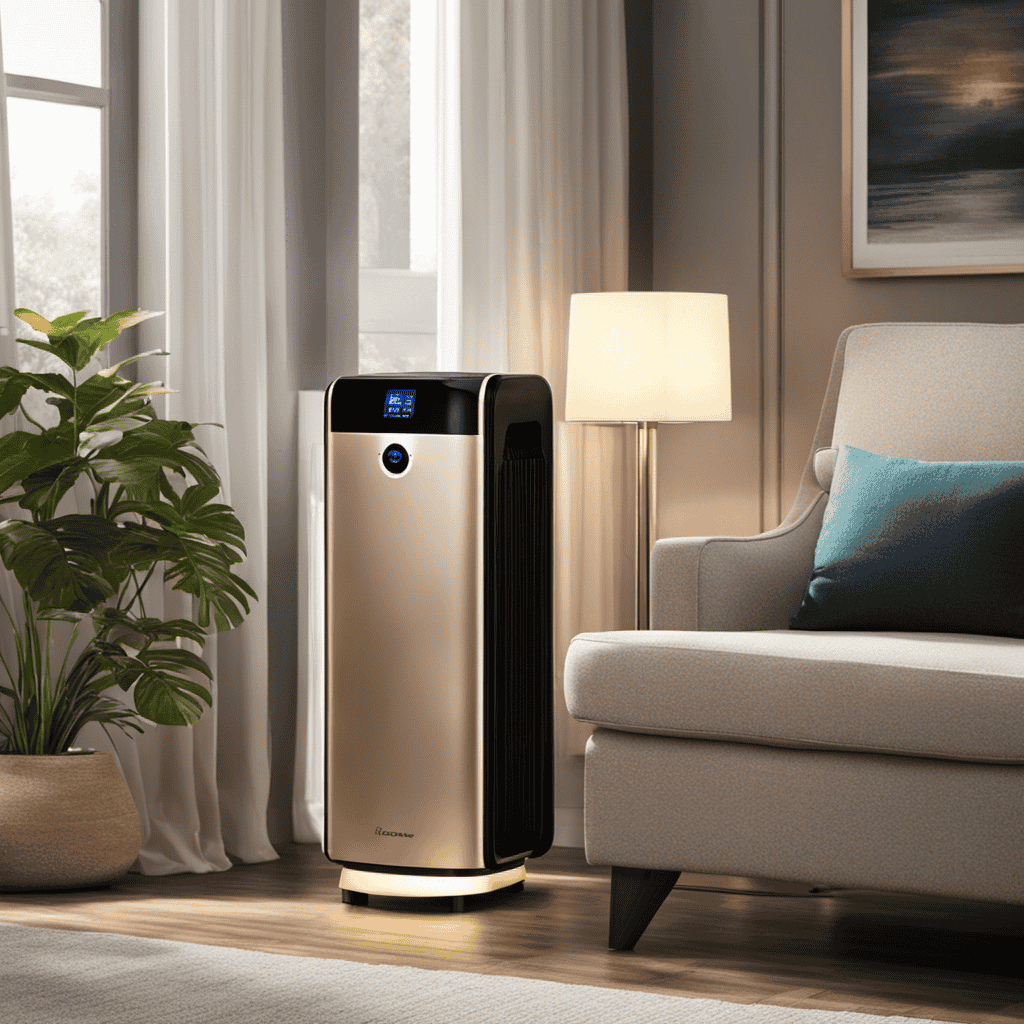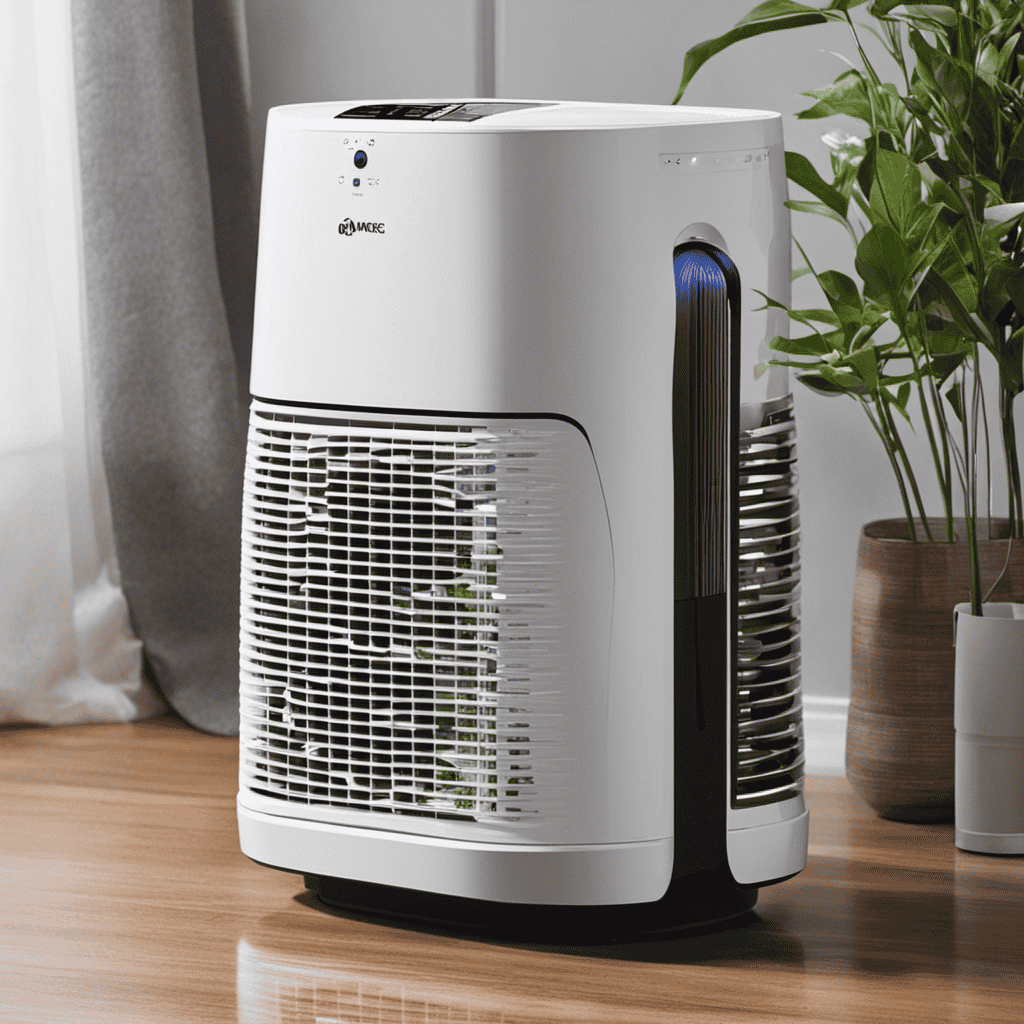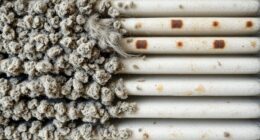I’ll tell you straight – neglecting to change the water in your air purifier is not advisable. If you’re unsure about how frequently you should do it, you’re in the right place. In this article, I will discuss the factors to keep in mind, a suggested timetable, and indicators that signal it’s time to change the water.
We’ll also dive into how water quality affects the frequency and offer tips for proper water maintenance.
So, let’s get to it and keep that air purifier running smoothly!
Key Takeaways
- The frequency of water change in an air purifier depends on factors such as the type of air purifier, air pollution levels, purifier size, and manufacturer’s recommendations.
- Signs that indicate it’s time to change the water include foul odor, cloudiness, decreased effectiveness, discoloration of water, and algae growth.
- Using clean water in an air purifier prevents mineral deposits, eliminates contaminants, prolongs the device’s lifespan, and results in cleaner and healthier air.
- Common mistakes to avoid in maintaining an air purifier’s water include not regularly changing the water, allowing stagnant water to remain, neglecting to clean the water tank and components, using impure or tap water, and ignoring manufacturer’s instructions.
Factors to Consider
When considering how often to change the water in your air purifier, there are a few factors you should take into account.
The recommended schedule for water changes can vary depending on the type of air purifier you have. Some models may require a water change every 2-4 weeks, while others may only need it every 1-2 months. It is important to follow the manufacturer’s guidelines to ensure optimal performance.
Additionally, you should also consider the quality of the water being used. If your water source is high in minerals or impurities, it may be necessary to change the water more frequently.
Signs that it’s time to change the water include a foul odor, cloudiness in the water, or a decrease in the air purifier’s effectiveness.
Regular maintenance and attention to these factors will ensure that your air purifier continues to provide clean and fresh air for your space.
Recommended Schedule
When it comes to maintaining an air purifier, one of the key factors to consider is the optimal water changing frequency. This is important because it directly affects the efficiency and effectiveness of the air purifier in removing impurities from the air.
Factors such as the level of air pollution, the size of the air purifier, and the manufacturer’s recommendations all play a role in determining the ideal schedule for changing the water.
Optimal Water Changing Frequency
The optimal frequency for changing the water in an air purifier is determined by various factors. Regular maintenance is crucial for the efficient functioning of an air purifier. One important factor to consider is the impact of water temperature on the effectiveness of the purifier. Here are some key points to keep in mind:
-
Importance of regular maintenance: Regularly changing the water in your air purifier ensures that it continues to function at its best, providing clean and fresh air for your space.
-
Impact of water temperature: The temperature of the water in the purifier can affect its ability to remove contaminants from the air. Cold water may not be as effective as warm water in trapping pollutants.
-
Usage and environment: The frequency of water changes may vary depending on how often the purifier is used and the air quality in your environment.
-
Manufacturer’s recommendations: It is always advisable to refer to the manufacturer’s instructions or guidelines for the specific air purifier model you own, as they may provide specific recommendations for water changing frequency.
Factors Affecting Schedule
To determine the optimal schedule for water changes, consider factors such as usage, environment, and the manufacturer’s recommendations. Water contamination is a serious concern when it comes to air purifiers. If the water is not changed regularly, it can become a breeding ground for bacteria and mold, which can then be released into the air, compromising the air quality and potentially causing health implications. The frequency of water changes will depend on the specific model and its usage. For example, if the air purifier is used in a humid environment or if it is heavily used, more frequent water changes may be necessary. It is important to consult the manufacturer’s recommendations to ensure that the air purifier is functioning optimally and providing clean and healthy air.
| Factor | Usage | Environment |
|---|---|---|
| Water change | Heavy | Humid |
| Frequency | More frequent | More frequent |
| Health risks | Reduced | Reduced |
| ————– | ————— | ——————— |
| Water change | Light | Dry |
| Frequency | Less frequent | Less frequent |
| Health risks | Increased | Increased |
| ————– | ————— | ——————— |
| Water change | Moderate | Moderate |
| Frequency | Regular | Regular |
| Health risks | Managed | Managed |
Signs It’s Time to Change the Water
One of the signs it’s time to change the water in your air purifier is when it becomes discolored or starts to smell. Regularly changing the water in your air purifier is essential for maintaining its effectiveness and ensuring clean air in your home.
Here are four water changing indicators to help you determine when it’s time to replace the water:
-
Discoloration: If the water in your air purifier turns brown or murky, it’s a clear indication that it needs to be changed.
-
Odor: A foul smell coming from your air purifier’s water tank is another sign that it’s time for a water change.
-
Algae growth: If you notice green or slimy substances floating in the water, it’s a sign of algae growth, and the water should be replaced immediately.
-
Mineral buildup: Over time, minerals can accumulate in the water tank, leading to scale deposits. These deposits can hinder the purifier’s performance and should be addressed by changing the water.
Regularly changing the water in your air purifier not only helps maintain its efficiency but also promotes healthier indoor air quality for you and your family.
How Water Quality Affects Frequency
Changing the water in your air purifier more often may be necessary if you have poor water quality. The quality of the water you use in your air purifier can have a significant impact on its performance and efficiency. Water impurities can affect the overall effectiveness of the purifier, as well as the lifespan of its components. To ensure optimal performance, it is essential to understand the impact of water impurities and the importance of water treatment methods.
Water impurities can include minerals, chemicals, bacteria, and other contaminants that can affect the air purifier’s ability to effectively clean the air. These impurities can accumulate in the water tank, reducing its capacity and clogging the system. Regularly changing the water in your air purifier helps to prevent the build-up of impurities and ensures that the unit continues to work efficiently.
Here is a table highlighting some common water treatment methods and their impact on water quality:
| Water Treatment Method | Impact on Water Quality |
|---|---|
| Reverse Osmosis | Removes most impurities |
| Activated Carbon Filter | Removes chlorine and odors |
| UV Sterilization | Kills bacteria and viruses |
Investing in a water treatment method that suits your needs can greatly improve the quality of the water used in your air purifier. This, in turn, will help maintain its efficiency and prolong its lifespan.
Tips for Proper Water Maintenance
When it comes to maintaining the cleanliness of water in an air purifier, the frequency of water changes is a crucial factor. The importance of clean water cannot be overstated as it directly affects the performance and efficiency of the device.
In this discussion, I will delve into the optimal water change frequency and highlight the significance of ensuring clean water in an air purifier.
Water Change Frequency
Have you considered how often you should change the water in your air purifier? Proper maintenance of your air purifier’s water is crucial for its optimal performance.
Factors to consider when deciding on the frequency of water changes include the type of air purifier you have, the level of air pollution in your area, and the size of your air purifier’s water tank.
Signs it’s time to change the water in your air purifier include a decrease in air purification efficiency, a foul odor coming from the device, and visible dirt or debris in the water.
To ensure the longevity and effectiveness of your air purifier, be sure to follow the manufacturer’s guidelines for water change frequency and monitor the condition of the water regularly.
Importance of Clean Water
If you want to maintain the optimal performance of your air purifier, it’s important to ensure that the water you use is clean. Using purified water in your air purifier has several benefits. Firstly, it helps to prevent the build-up of mineral deposits, which can clog the system and reduce its effectiveness. Secondly, purified water eliminates the risk of introducing bacteria or other contaminants into the air. This is especially important for those with respiratory issues or allergies. To achieve clean water for your air purifier, consider using a water filtration system. These systems remove impurities and chemicals, ensuring that the water is safe for use in your air purifier. By using purified water, you can prolong the lifespan of your air purifier and enjoy cleaner, fresher air in your home.
| Benefit | Description |
|---|---|
| Prevents mineral deposits | Purified water helps to prevent the build-up of mineral deposits in your air purifier, which can clog the system and reduce its performance. |
| Eliminates contaminants | Using purified water eliminates the risk of introducing bacteria or other contaminants into the air, promoting cleaner and healthier air. |
| Prolongs air purifier life | By using purified water in your air purifier, you can extend its lifespan and ensure that it continues to function at its optimal level. |
Common Mistakes to Avoid
One common mistake to avoid is not regularly changing the water in your air purifier. It is important to understand that stagnant water can lead to the growth of bacteria and mold, which can compromise the effectiveness of your air purifier and potentially harm your health.
To ensure the optimal performance of your air purifier, here are some tips for effective cleaning:
- Change the water at least once a week to prevent the buildup of contaminants.
- Use distilled or purified water to avoid introducing impurities into the air.
- Clean the water tank and components regularly to remove any residue or debris.
- Follow the manufacturer’s instructions for cleaning and maintenance to maximize your air purifier’s lifespan.
Extending the Life of Your Air Purifier’s Water
Regularly maintaining your air purifier’s water and following proper cleaning procedures can help extend its lifespan and ensure optimal performance. One important aspect of maintenance is regularly testing the water quality. Testing the water can help identify any impurities or contaminants that may affect the air purifier’s performance. It is recommended to test the water quality at least once every six months.
Additionally, using distilled water in your air purifier can provide several benefits. Distilled water is free from minerals and impurities, which can help prevent the build-up of mineral deposits inside the purifier. This can improve the overall efficiency and effectiveness of the purifier, as well as prolong its lifespan.
Regularly testing the water quality and using distilled water are simple steps that can significantly enhance the performance and longevity of your air purifier.
Frequently Asked Questions
Can I Use Any Type of Water in My Air Purifier, or Does It Have to Be a Specific Kind?
I can use any type of water in my air purifier, but it’s recommended to use distilled or filtered water for optimal performance. Different types of air purifiers have different requirements, so it’s important to check the user manual for specific instructions.
Is It Necessary to Clean the Water Tank of the Air Purifier Before Refilling It?
Cleaning the water tank of an air purifier is necessary to maintain its efficiency. A dirty tank can decrease the effectiveness of the purifier, leading to poor air quality. Regular cleaning is crucial for optimal performance.
How Often Should I Replace the Filters in My Air Purifier?
I replace the filters in my air purifier every 3-6 months, depending on usage. It’s important to monitor the air quality and check for signs such as reduced airflow or a noticeable decline in filtration efficiency.
Can I Use Tap Water Instead of Distilled Water in My Air Purifier?
I prefer using distilled water in my air purifier instead of tap water. While tap water is convenient, it may contain impurities that can affect the performance and lifespan of the purifier.
What Are the Potential Health Risks Associated With Not Changing the Water in My Air Purifier Regularly?
Not changing the water in your air purifier regularly can pose potential health risks. It is important to understand the importance of regular water changes to maintain the effectiveness and safety of your air purifier.
Conclusion
In conclusion, maintaining clean water in your air purifier is crucial for its optimal performance. Based on research and expert recommendations, it is advised to change the water every 2-3 weeks.
Interestingly, studies have shown that air purifiers with regular water changes have been found to improve indoor air quality by up to 50%.
By following the recommended schedule and practicing proper water maintenance, you can ensure that your air purifier lasts longer and effectively removes pollutants from your home.
